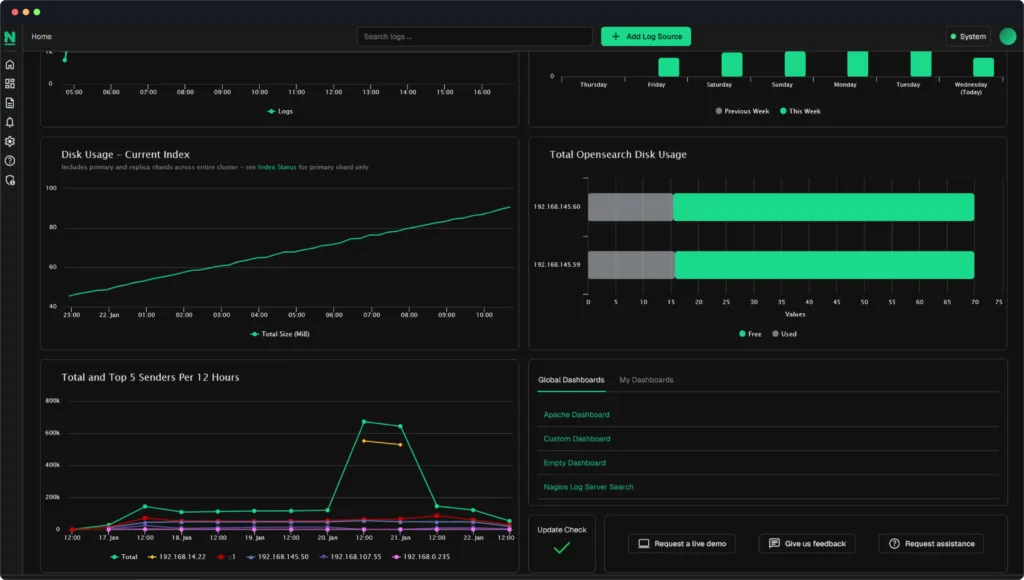Quickly and easily view, sort, and configure logs from a wide variety of sources within your environment.
Sign up and download now for a fully functional 30 day trial allowing you access to all the functionality designed for enterprise-scale deployments.
Go To Downloads

Enter your email address to get installation guides, release updates, and exclusive support directly in your inbox.
Note: Nagios Log Server was built to run natively on CentOS and Red Hat versions of Linux. You can use our prepackaged VM and install in VMware. We offer this pre-installed OVA file for quickly installing Log Server. Maintenance and support of underlying operating system or virtual machine architecture are the sole responsibility of the customer.
Looking for the most recent 2024R1 release? Download the latest Nagios Log Server 2024R1 OVA.
64-bit .ova
This is the quickest way to get started using Nagios Log Server. Works with VMware, VirtualBox, and anything that can use OVF.
For an easy installation of Nagios Log Server on VMware, follow the steps outlined here.
If you’re a visual learner, check out the step-by-step video guides below to get Log Server up and running in your web browser.
Install Log Server within VMware Workstation Player in less than 20 minutes with this guide outlining all the required steps.
Since Log Server needs a virtual machine in order to run on Windows, you will need to download VMware Workstation Player below. Once you install VMware Workstation Player, you will be prompted to restart your computer.
Note: Nagios Log Server will not install natively on Windows; however, you can use our prepackaged VM and install in VMware or Hyper-V. We offer this pre-installed OVA/VHD file for quickly installing Log Server. Maintenance and support of underlying operating system or virtual machine architecture are the sole responsibility of the customer.
Looking for the most recent 2024R1 release? Download the latest Nagios Log Server 2024R1 OVA or 2024R1 VHD.
64-bit .ova
This is the quickest way to get started using Nagios Log Server. Works with VMware, VirtualBox, and anything that can use OVF.
64-bit .vhd
This download works within Hyper-V.
For an easy installation of Nagios Log Server on VMware, follow the steps outlined here.
If you’re a visual learner, check out the step-by-step video guides below to get Log Server up and running in your web browser.
Install Log Server within VMware Workstation Player in less than 20 minutes with this guide outlining all the required steps.
Since Log Server needs a virtual machine in order to run on Windows, you will need to download VMware Workstation Player below. Once you install VMware Workstation Player, you will be prompted to restart your computer.
Follow these steps for an easy installation of Nagios Log Server on Hyper-V.
Follow these Microsoft instructions on enabling Hyper-V on your system.
Install Log Server within Hyper-V using these steps, and you’ll be up and running in less than 20 minutes.
Looking for the most recent 2024R1 release? Download the latest Nagios Log Server 2024R1 .tar.gz.
64-bit .tar.gz
This download is for manually installing Nagios Log Server on a CentOS, RHEL, Oracle, Debian, or Ubuntu LTS system.
These steps will take you through the process of installing Log Server on a clean, minimal installation.
If you prefer a visual walk-through, watch the Linux installation video below.
Get up and running in less than 20 minutes with this guide outlining the steps required to install Log Server on a Linux machine.
The following video will walk you step by step through how to manually install Log Server onto a clean, minimal installation. You will need:
The final installation steps for setting up Nagios Log Server. Vadim walks through adding a log source, creating custom filters, and adding additional instances.
Our knowledgeable techs can help you get up and running quickly with Nagios Log Server. Let us help you deploy Log Server with a remote-assist or a Quickstart that’s designed to save you time and get you started on the right foot.
The Nagios Log Server User Guide is designed to link to and include external documents and video tutorials. We designed this guide with ease of use in mind and hope you will find it easy to use and understand.
Nagios, the Nagios logo, and Nagios graphics are the servicemarks, trademarks, or registered trademarks owned by Nagios Enterprises. All other servicemarks and trademarks are the property of their respective owner. Website Copyright © 2009-2025 Nagios Enterprises, LLC. All rights reserved.
Enter your email address to get installation guides, release updates, and exclusive support directly in your inbox.